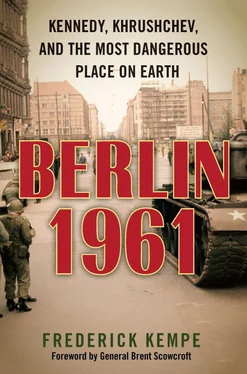The East German pity toward their Soviet occupiers, whom they considered inferior to them, came from what they could see with their own eyes: undernourished, unwashed teenagers in soiled uniforms who would drop to the ground to retrieve the unfinished stubs of their discarded cigarettes or trade their service medals and gasoline for any form of consumable alcohol that would help them briefly escape their miserable existence.
The pity was also stirred by the occasional alarms that accompanied desperate attempts at desertion. For the teenage soldiers, the brutality of officers, hazing by fellow soldiers, and the cold and overcrowded quarters occasionally became too much to bear.
Their barracks, built during the Third Reich or earlier, housed three times the number of soldiers that Hitler had ever bunked there. The latest escape had come after an insurrection on New Year’s Eve, when a barracks uprising in Falkenberg had resulted in the escape to West Berlin of four soldiers and the dispatch of Soviet search parties along the Berlin border. Stories circulated of Soviet troops setting alight barns and other structures where deserters had gone in hiding—burning the escapees alive alongside farm animals.
That only increased a deeply ingrained German dread of the Soviets.
That dread had grown after the events of June 17, 1953, when Soviet troops and tanks had put down a workers’ revolt after Stalin’s death that had shaken the young East German state to its fragile foundations. As many as 300 East Germans had died then, and a further 4,270 were imprisoned.
Yet the deeper roots of East German terror were found in the events that Hillers had described. There was a reason why women in East Berlin froze up whenever a Soviet soldier passed by or when East German leader Walter Ulbricht spoke on the radio of the enduring friendship with the Soviet people.
Hillers described why outsiders had so little sympathy for what German women had suffered—and why many Germans wondered whether some vengeful God had delivered this punishment of rape in retribution for their own misbehavior. “Our German calamity,” Hillers wrote during the first days of occupation, “has a bitter taste—of repulsion, sickness, insanity, unlike anything in history. The radio just broadcast another concentration camp report. The most horrific thing is the order and the thrift: millions of human beings as fertilizer, mattress stuffing, soft soap, felt mats—Aeschylus never saw anything like that.”
Hillers despaired at the stupidity of Nazi leaders who had issued orders that liquor should be left behind for advancing Soviet troops on the theory that inebriated soldiers would be less dangerous adversaries. If it had not been for Soviet drunkenness, Hillers wrote, Berlin women would have suffered only half as much rape at the hands of Russians who “aren’t natural Casanovas” and thus “had to drown their inhibitions.”
With characteristic power, she described one of the many times she’d been raped and how it had driven her to seek protection.
The one shoving me is an older man with gray stubble, reeking of brandy and horses… No sound. Only an involuntary grinding of teeth when my underclothes are ripped apart. The last untorn ones I had.
Suddenly his finger is on my mouth, stinking of horse and tobacco. I open my eyes. A stranger’s hands expertly pulling apart my jaws. Eye to eye. Then with great deliberation he drops a gob of gathered spit into my mouth.
I’m numb. Not with disgust, only cold. My spine is frozen: icy, dizzy shivers around the back of my head. I feel myself gliding and falling, down, down through the pillows and the floorboards. So that’s what it means to sink into the ground.
Once more eye to eye. The stranger’s lips open, yellow teeth, one in front half broken off. The corners of the mouth lift, tiny wrinkles radiate from the corners of his eyes. The man is smiling.
Before leaving he fishes something out of his pants pocket, thumps it down on the nightstand, and without a word, pulls the chair aside, and slams the door shut behind him. A crumpled pack of Russian cigarettes, only a few left. My pay.
I stand up—dizzy, nauseated. My ragged clothes tumble to my feet. I stagger through the hall… into the bathroom. I throw up. My face green in the mirror, my vomit in the basin. I sit on the edge of the bathtub, without daring to flush, since I’m still gagging and there’s so little water left in the bucket.
It was at that point that Marta Hillers made her decision. She cleaned herself up a bit and went to the street to hunt for a “wolf,” a higher-ranking Soviet officer who would become her protector. She concluded it was better to be abused by just one Russian on a regular basis than by an unending string of them. Like millions of other Germans, Hillers was reaching an accommodation with an occupation she could not resist.
Only years later would researchers try to reconstruct the full horror of that time. Between the late summer and early autumn of 1945, a minimum of 110,000 women between the ages of twelve and eighty-eight had been raped. Some 40 percent of the victims were raped on multiple occasions. One in five of the rape victims became pregnant, roughly half of these gave birth, and the other half had abortions, often without anesthesia. Thousands of women killed themselves for the shame of having been raped or out of fear of being the next victims. Some 5 percent of all Berlin newborns in the following year would be “Russenbabys.” Across Germany, the number would be 150,000 to 200,000 children.
It was as these children were first becoming teenagers, in 1958, that Khrushchev would provoke what would become known as the Berlin Crisis.
2
KHRUSHCHEV: THE BERLIN CRISIS UNFOLDS
West Berlin has turned into a sort of malignant tumor of fascism and revanchism. That’s why we decided to do some surgery.
Nikita Khrushchev, at his first press conference as premier, November 27, 1958
The next President in his first year is going to be confronted with a very serious question on our defense of Berlin, our commitment to Berlin. It’s going to be a test of our nerve and will…. We’re going to be face-to-face with the most serious Berlin crisis since 1949 or 1950.
Senator John F. Kennedy, in a presidential campaign debate with Vice President Richard Nixon, October 7, 1960
PALACE OF SPORTS, MOSCOW
MONDAY, NOVEMBER 10, 1958
On an unlikely stage and before an unsuspecting audience, Nikita Khrushchev launched what the world would come to know as “the Berlin Crisis.”
Standing at the center of Moscow’s newest and grandest field house for indoor sports, the Soviet leader told a gathering of Polish communists that he planned to renounce the postwar agreements that had been the basis for Europe’s fragile stability. He would abrogate the Potsdam accord that had been signed with wartime allies and unilaterally change Berlin’s occupied status, with the aim of liquidating the city’s western part altogether, and removing all military forces from the city.
The venue for his remarks, the Palace of Sports, which rested beside Lenin Central Stadium, had opened to great fanfare two years earlier as a state-of-the-art stage to show off Soviet athletic accomplishment. Since then, however, its most memorable moment had been the stunning defeat of the Soviets by the Swedes at the 1957 ice hockey world championships, which had been tainted by the boycott conducted by the U.S. and other Western hockey powers in protest against the Soviet crackdown in Hungary. The Swedish victory had come after a defenseman had head-blocked a puck before the goal, producing a gusher of blood and the championship.
Читать дальше











